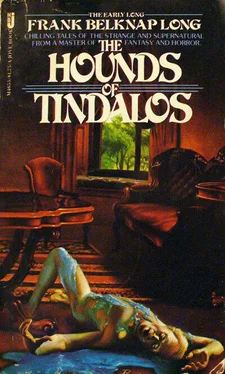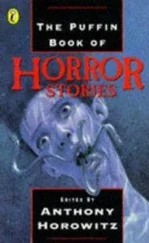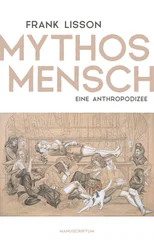I kicked off my sneakers first and discarded the bathrobe almost simultaneously with my swift ascent of the wreckage adjacent to the vanished part of the storm-shattered breakwater. I had no way of knowing how deep the water might be at that particular spot, but when a narrow channel widens out into a pool it is likely to have a greater depth as well, and I was nine-tenths sure it was the opposite of shallow.
I remained for a moment staring down at that dark expanse of water, until I became convinced that no bobbing young head seemed likely to send a great wave of relief surging over me, for more additional seconds than I cared to risk wasting.
To have dived in would have risked a stunning blow to my head from the cluttered wreckage, which projected out over the pool in a dozen directions. So I let myself down slowly and cautiously before swimming out into the sluggishly moving current.
I abandoned my overhand strokes to plunge into the depths at about the spot where it seemed most likely John had been swallowed up. The farther I descended the less sluggish the current became, and I was soon being carried erratically back and forth in a tide-buffeted fashion.
It was my first attempt to save anyone from drowning, and I was lacking in all of the qualities that can make such a rescue attempt quickly successful.
I began to fear I would have to come up for air and descend a second time when I saw him, through a blurry film of dark water. Only vaguely at first and then more distinctly, revolving slowly about as if on some small underwater treadmill that was causing him neither to rise nor to descend farther.
Fortunately he did not struggle when I got to him, as close-to- drowning people are supposed to do unless you caution them in the open air where your voice carries. In another moment I had a tight grip on his arm and was ascending with him through what now seemed a depth of at least twenty fathoms.
Five minutes later he was lying stretched out on the sand at the base of the wreckage, with his mother bending over him. She was sobbing softly and looking up at me, her eyes shining with gratefulness.
No seven-year-old could have looked more capable of summoning to his aid all the innate vitality of the very young of sturdy constitution. The color was flooding back into his cheeks, and his eyes were fluttering open with the stubborn, resolute look of a young explorer who refuses to give up, despite the worst buffetings that fate can inflict.
I suppose I should have felt nothing but relief and sympathy. But I was still angry, and the first words I spoke to him were so harsh that 1 almost instantly found myself regretting them.
“You should have known better than to put your mother through something like this. It’s a good thing you’re not my son. If you were there would be no baseball or anything else for you for one solid month. You’d just have to sit at the window and call down to your friends. Probably they are as bad as you are. Unruly, selfish, totally undisciplined kids run together in wolf cub packs.”
The instant I stopped his eyes opened very wide, and he stared up at me without the slightest trace of hostility or resentment in his gaze. It was as if he realized I had spoken like the kind of person I wasn’t and really could never be.
“I couldn’t help it,” he said. “There was something there I knew I’d find if I looked around for it. I didn’t want to find it. But you can’t help it when you dream about something you don’t want to find, and you can’t wake up in time—”
“You dreamed about it?”
“Not like when I go to sleep. I was just thinking about what it would look like when I found it.”
“And that’s why you ran off the way you did, without warning your mother that you were about to do something dangerous?”
“I couldn’t help it. It was like something was pulling me.”
“You were looking at it when I spoke to you,” I said. “So you must have found it. It’s too bad you lost it when you fell into the water. If you still had it, what you want us to believe might make a little more sense. Not much — but a little.”
“I didn’t lose it,” he said. “It’s right here in my hand.”
“But that’s impossible.”
“No, it isn’t,” his mother said, interrupting us for the first time. “Look how tightly clenched his right hand is.”
I could hardly believe it, if only because it made far more sense to assume that the hands of a boy falling from a collapsing board would have opened and closed many times in a desperate kind of grasping, first at the empty air and then at a smothering wall of water rushing in upon him. What I had failed to recognize was that in such an extremity one may hold on to some small object that has just been picked up — a pebble or a shell — even more tightly.
There might even be — more to it than that. Not only adult men and women, but not a few children, had endured unspeakable torments without relinquishing, even in death, some small object precious to them, or feared by them in some terrible secret way. The Children’s Crusade—
It was hard for me to imagine what could have put such thoughts into my mind, for I hadn’t as much as caught a glimpse of the object which John had seemingly found very quickly. Surely what he had said about it could be dismissed as childish prattle. A dreamlike compulsion, coming upon him suddenly, and forcing him to go in search of it, as if drawn by a magnet. Powerless to resist, unable to break that mysterious binding influence. Not wanting to find it at all, but aware that he had been given no choice. Not wanting—
Susan had joined us beneath the wreckage, ignoring the wishes of her mother, who had waved her back to make her son’s recovery less of a problem. Another small child, hopping about in the sand, would have made it difficult for her to give all of her attention to what I’d just been saying to her son.
But now she was looking at me as if I had added a new, unexpected complication by my two full minutes of silence.
“Let him see what it was you picked up, John,” she said. “Just open your hand and show it to him. You’re making some strange mystery out of it, and so is he. I’d like to see it too. Then we’ll all be happier.”
“I can’t,” John said.
“You can’t what?” I demanded, startled by the look of astonishment and pain that had come into his eyes.
“I can’t move my fingers,” he said. “I just found out. I didn’t try before.”
“Oh, that’s nonsense,” I said. “Listen to me, before you say anything even more foolish. You must have at least tried to move your fingers a dozen or more times before I rescued you. Just as often afterward.”
He shook his head. “That’s not true.”
“It has to be true. That’s your right hand. You use it all the time. Everyone does.”
“I can’t move my fingers,” he reiterated. “If I’d opened my hand it would have fallen out—”
“I know all that,” I said. “But you could have at least found out before this whether you could so much as move your fingers. It would have been a natural thing to do.”
It had been difficult for me to think of his mother in a very special way, so overwrought had she become since I had gone to his rescue. But something of the beach-temptress look had returned when her son had opened his eyes and had seemed no worse for the tragedy that had almost overtaken him. But now she looked distraught again. Sudden fear flamed in her eyes.
“Could it be — hysterical paralysis?” she asked. “It can happen, I’ve been told, in quite young children.”
“I don’t think so,” I said. “Just try to stay calm. We’ll know in a moment.”
I took her son’s hand, raised it, and looked at it closely. He made no protest. The fingers could not have been more tightly clenched. The nails, I felt, must be biting painfully into the flesh of his palms. His knuckles looked bluish.
Читать дальше












